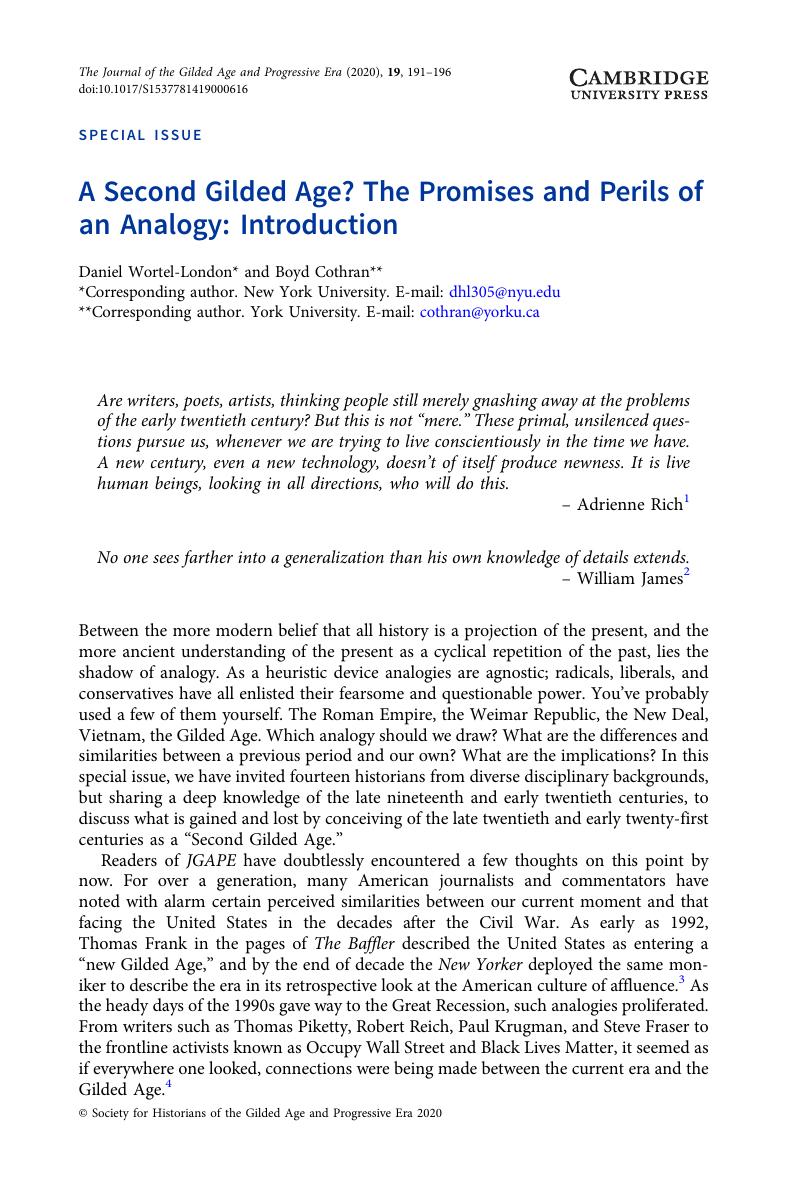Article contents
A Second Gilded Age? The Promises and Perils of an Analogy: Introduction
Published online by Cambridge University Press: 26 February 2020
Abstract

- Type
- Special Issue: A Second Gilded Age?
- Information
- The Journal of the Gilded Age and Progressive Era , Volume 19 , Issue 2 , April 2020 , pp. 191 - 196
- Copyright
- Copyright © Society for Historians of the Gilded Age and Progressive Era 2020
References
Notes
1 Rich, Adrienne, Arts of the Possible: Essays and Conversations (New York: W. W. Norton & Company, 2002), 9Google Scholar.
2 James, William, The Letters of William James (New York: Cosimo Inc, 2008), 2Google Scholar.
3 Frank, Thomas, “Opening Salvo: The New Gilded Age” in Commodify Your Dissent: Salvos from the Baffler, 1st ed., eds. Frank, Thomas and Weiland, Matt (New York: W.W. Norton & Company, 1997), 23–28Google Scholar; Remnick, David, ed., The New Gilded Age: The New Yorker Looks at the Culture of Affluence (New York: Random House, 2000)Google Scholar.
4 Piketty, Thomas and Goldhammer, Arthur, Capital in the Twenty-First Century (Cambridge MA: The Belknap Press of Harvard University Press, 2014)CrossRefGoogle ScholarPubMed; Robert Reich, “We're Living in a New Gilded Age of Wealth and Power,” Salon, Apr. 14, 2014, https://www.salon.com/2014/04/19/robert_reich_were_living_in_a_new_guilded_age_of_wealth_and_power_partner/ (accessed Jan. 18, 2019); Paul Krugman, “Why We're in a New Gilded Age,” The New York Review of Books, May 8, 2014, https://www.nybooks.com/articles/2014/05/08/thomas-piketty-new-gilded-age/ (accessed Jan. 18, 2019); Steve Fraser, “What We Can Learn From the Workers, Activists and Even Politicians Who Tore Down the First Gilded Age,” The Nation, Apr. 2, 2015, https://www.thenation.com/article/what-we-can-learn-workers-activists-and-even-politicians-who-tore-down-first-gilded-a/ (accessed Jan. 18, 2019). ). Taylor, Keeanga-Yamahtta, From #BlackLivesMatter to Black Liberation (Chicago: Haymarket Books, 2016)Google Scholar.
5 Rick Hampson, “America's Second Gilded Age: More Class Envy Than Class Conflict,” USA Today, May 17, 2018, https://www.usatoday.com/story/news/2018/05/17/americas-gilded-ages-then-and-now-and-how-they-differ/615185002/ (accessed Jan. 11, 2019).
6 Sarah Jones, “Lessons From the Gilded Age,” The New Republic, June 13, 2018, https://newrepublic.com/article/149005/lessons-gilded-age (accessed Jan. 11, 2019).
7 “How Gilded Ages End,” The American Prospect, Apr. 29, 2015, https://prospect.org/article/how-gilded-ages-end (accessed Jan. 11, 2019).
8 James Fallows, “Elizabeth Warren on the Second Gilded Age,” The Atlantic, May 19, 2016, https://www.theatlantic.com/notes/2016/05/elizabeth-warren-on-the-second-gilded-age/483614/ (accessed Jan. 11, 2019).
9 Crowie, Jefferson, The Great Exception: The New Deal & the Limits of American Politics (Princeton, NJ: Princeton University Press, 2016)CrossRefGoogle Scholar; James Livingston, “The Myth of a ‘Second Gilded Age,’” Chronicle of Higher Education, Jan. 31, 2016, https://www.chronicle.com/article/The-Myth-of-a-Second-Gilded/235072 (accessed Jan. 18, 2019).
10 Fraser, Steve, The Age of Acquiescence: The Life and Death of American Resistance to Organized Wealth and Power (New York: Basic Books, 2016)Google Scholar.
11 Heath W. Carter, “Why We're Not in a New Gilded Age,” Religion and Politics, Feb. 9, 2016 (accessed Jan. 18, 2019).
12 Steve Hahn, “The Long Gilded Age,” The Nation, July 18 2018 (accessed Jan. 17, 2019).
13 Nelson, Scott Reynolds, “Introduction: Reflecting on History When Markets Tumble,” The Journal of the Gilded Age and Progressive Era 10:4 (Oct. 2011): 401CrossRefGoogle Scholar.
14 Fink, Leon, The Long Gilded Age: American Capitalism and the Lessons of a New World Order (Philadelphia: University of Pennsylvania Press, 2015), 153CrossRefGoogle Scholar.
15 Maggor, Noam, “The Great Inequalizer. American Capitalism in the Gilded Age and Progressive Era,” The Journal of the Gilded Age and Progressive Era, Volume 15:3 (2016): 242CrossRefGoogle Scholar.
16 Schneirov, Richard, “Thoughts on Periodizing the Gilded Age: Capital Accumulation, Society, and Politics, 1873–1898,” The Journal of the Gilded Age and Progressive Era 5:3 (2006): 189CrossRefGoogle Scholar. Fink, The Long Gilded Age.
17 Schneirov, “Thoughts on Periodizing the Gilded Age,” 190.
18 For an insightful treatment of how historians can best intervene in public debates and policy, see Green, Alix R.History, Policy and Public Purpose: Historians and Historical Thinking in Government (London: Palgrave Macmillan, 2016)CrossRefGoogle Scholar.
19 Hofstadter., RichardThe Age of Reform: from Bryan to F.D.R. (New York: Vintage Books, 1995)Google Scholar; Wiebe, Robert H., The Search for Order, 1877–1920 (New York: Hill and Wang, 1967)Google Scholar; Sklar, Martin J., Woodrow Wilson and the Political Economy of Modern United States Liberalism (Indianapolis, IN: Bobbs-Merrill, 1970)Google Scholar.
20 See Stein, Judith, Pivotal Decade: How the United States Traded Factories for Finance in the Seventies (New Haven, CT: Yale University Press, 2011)Google Scholar; Phillips-Fein, KimFear City: New York's Fiscal Crisis and the Rise of Austerity Politics (New York: Metropolitan Books, 2017)Google Scholar.
- 2
- Cited by


